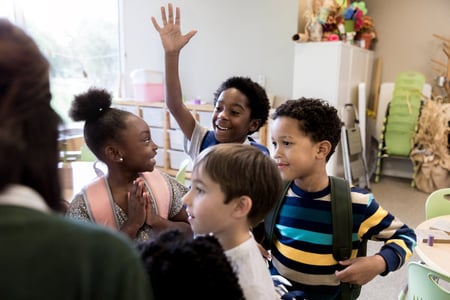
Looking for ways to help educators reflect on how teachers perceive “challenging behaviors”? There is a wonderful podcast interview Reframing “Challenging Behaviors” and How our Response Matters to listen to AND an exciting workshop that follows up on the conversation about three tips to help with Behavior Management in Early Childhood Environments at the InterAct Summit 2022 presented by Michelle Galindo.
“Challenging Behavior” is always a hot topic for educators as we care for and guide young children’s emotional well being. It is especially important as we are now living through so many changes, transitions and adaptations young children are learning to experience the best they can.
Come and join the Reframing “Challenging Behavior” and How our Response Matters workshop at the InterAct NOW: CLASS Summit as we will share three proven strategies to:
- Reflect on the impact of emotional triggers and model Self Composure to support Self-Regulation
- Ideas to Create a Safe Space to Release strong emotions
- Practice Acknowledging Feelings while stating a boundary or setting limits.
Experience group activities to promote practice and reflection as we collaborate on interactions that have guided and supported young children’s positive behavior.
Managing Our Adult Emotions
I know that as a parent, I continuously need to check in with every strategy highlighted. And, as a professional I understand the impact of my responses when children’s behaviors trigger my emotions. Adult responses are so critical to supporting healthy development for young children.
We know that guiding positive behavior is a learning process for young children as their brains grow and develop the ability to regulate behavior and manage impulses.
So what does this mean in our day-to-day interactions and experiences with children? How do I learn to manage my own emotional triggers so that I MODEL safe and positive ways to manage strong emotions.
Sometimes as a parent I have an urge to yell or use a negative tone of voice because I AM TIRED. How do I handle this moment? What can I do to decompress and respond versus react? After all, children are learning how to manage emotions by the way we demonstrate our behaviors or express our emotions.
As educators, we may at times be tempted to use a negative tone or express ourselves with irritation. What can I do in the moment instead so I can connect with children rather than disconnect? Let’s breathe and take deep breaths as our bodies move away from the flight or fight mode in our brains when we are triggered. You’ll then be able to respond with intentionality rather than react by emotion or impulse. Yes, like a toddler does! Toddler and young children react by an impulse or emotion and they need our consistent modeling of composure to learn how to manage these feelings…oh so many feelings ALL THE TIME!
Creating a Safe Space
Another strategy is the idea of creating a safe space to release strong emotions. This could be at home or in a childcare program. Consider a teepee or a corner where children can still see the teacher and other children, but can also step away. Include soft cushions to relax and release, a mirror to view themselves, soft items to squeeze, or towels to twist when angry.
Creating safe, warm and supportive environments motivate children to learn and practice positive behaviors when adults are responsive and consistent. Ohhh, I would love a space to take deep breaths and relax. Wouldn’t you? Where is your relaxation space in your home? We should consider creating a space for children and for ourselves. I already feel relaxed thinking about it!
Acknowledging Feelings
Ok, lastly we will expand on the important strategy of acknowledging feelings while stating a boundary. What does this mean? Think about a moment when you feel upset. Are you ready to hear a lecture or have someone tell you how you should solve that problem? Or, would you rather hear, “Ohhh, that sounds like a rough moment, feeling angry doesn’t feel good!” Yes, this is acknowledging feelings before any other type of information is shared.
Acknowledgment reassures children’s connection with you as they feel understood by being “there” in the moment of that feeling with them. The limit may sound like, “I know you want to stay outside and play longer, and you are upset that we have to go inside the class now (Acknowledgement). It’s time to go inside (Limit/Boundary) and tomorrow we can play outside again.”
Then we do our best to connect, such as, “How about bringing that shovel inside from the sand area and maybe using it in the sand table inside?” Connect, connect and connect with the moment children are in, these interactions make a big impact on your relationships with children!
Reflection
Now, I know that these strategies are easier said than done, because we all have emotional triggers and ways we manage with our own emotions and impulses. The big idea is to continue growing awareness and expanding your understanding of the replacement skills children need rather than labeling their behavior that is challenging.
Continuing to reflect with others working with children and viewing children’s behavior as an opportunity to learn about what behaviors they are in need of learning is the key to better connections and healthy relationships between adults and children! I encourage you to share your thoughts and ideas in support of our children’s growing minds and curious behaviors.
Time to Reflect! How do you manage emotional triggers “in the moment”? What are ways you encourage children’s positive behavior?
 Michelle Galindo is a bilingual, Spanish Early Childhood Education Specialist with 20 years in Early Childhood Education as a Professor of Child Development, Trainer and Consultant of Infant, Toddler and Preschool programs. Michelle has a Bachelor's degree in Child Development from San Diego State University and Masters degree in Educational Counseling.
Michelle Galindo is a bilingual, Spanish Early Childhood Education Specialist with 20 years in Early Childhood Education as a Professor of Child Development, Trainer and Consultant of Infant, Toddler and Preschool programs. Michelle has a Bachelor's degree in Child Development from San Diego State University and Masters degree in Educational Counseling.
Michelle is an impactful influence in the Early Education workforce presenting at conferences such as San Diego Early Years, NAEYC, CAAEYC, Teachstone Summits and has been interviewed for a CLASS PodCast on “Reframing Children’s Behavior”. Her charismatic personality and motivational facilitation approaches empowers, inspires and promotes educators' awareness on quality care and early education.
Michelle lives in San Diego, California, and is inspired by her husband and two children, Alyssa of 7 years old and Roberto Jr. of 4 years old.
